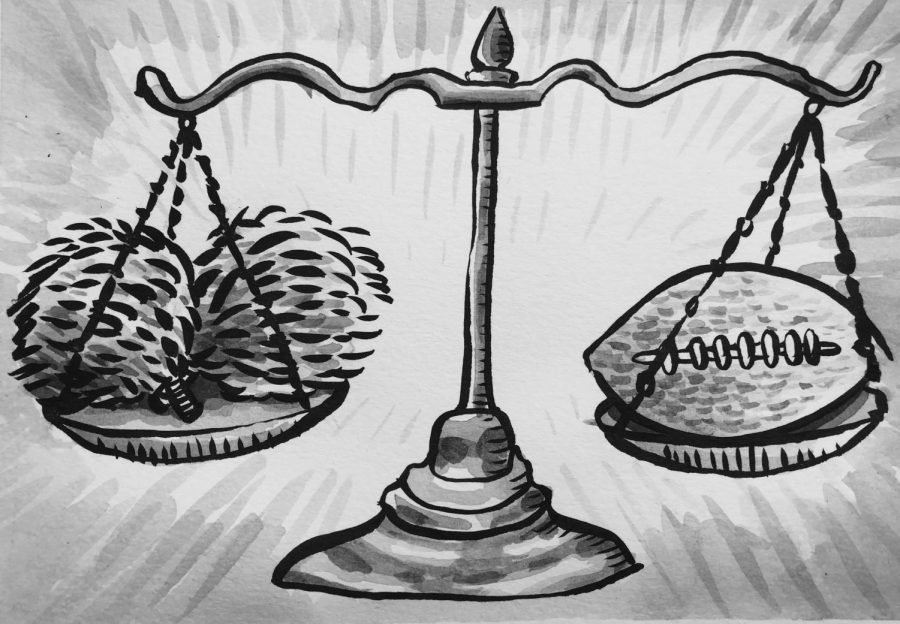Being athletic doesn’t mean you’re an athlete
What really makes someone an athlete? Some people are athletic, but it doesn’t mean they’re athletes.
April 22, 2018
What makes someone an athlete? Is it their ability to lift, to run fast, to always make the perfect catch, to do multiple backflips? At what point can a person no longer be classified an athlete?
These are the questions that, from my experience, throws athletes into heated debates, especially athletes who may be considered “on the cusp” of the classification. Contrary to what some people may think (i.e., “Everyone’s an athlete!”), there is a stiff line in the label, and it lies in the definition of the word.
Picture this: an army of small children, boys and girls alike, in adult-small t-shirts, some in red and others in orange, swarming and mindlessly kicking a neon green-and-blue soccer ball toward a pint-size goal. A few of them are hanging back in the middle of the field to retrieve the ball if it comes their way and kick it into the net behind them, which is the wrong one.
The parents don’t care and aren’t keeping score. They’re eating the post-game snacks meant for the children in their lawn chairs. One mom, however, has been holding binoculars to her face, despite being the closest to the field line. She’s upset her child’s team is losing and is the only one who cares.
One child thinks they’re playing tag. Another is picking their nose at the far corner of the field. That child was me.
So I wasn’t the best one out there. To begin with, I didn’t even care. But was I an athlete? Absolutely not.
Merriam-Webster defines the term “athlete” as “a person who is trained or skilled in exercises, sports, or games requiring physical strength, agility, or stamina.”
Our practices consisted of frantic, volunteer dads rounding children up in a game of sharks and minnows with a soccer ball and catching them if one decided to run out in the middle of the street. At least four children would cry. The dads only did this because their wives thought it’d be adorable and pressured them into participating.
Long story semi-short, we weren’t athletes. No agility or stamina. But we were too young to be, because we couldn’t even grasp the concept of training and athleticism.
Fast forward a few years, I began trying many different sports, such as ice skating, swimming, track and field and cross country (which I’d end up sticking with), basketball, tennis, gymnastics, etc. When I was able to be an effective participant in games/meets/performances and practices is when I became an athlete.
One doesn’t have to be good to be an athlete. I was told by my middle school basketball coach during a time-out of a scrimmage that I was the worst player on the team. But I was still an athlete, because I worked at it. I completed all the drills, played the games, even practiced on my own at home. And I think that’s where people get mixed up: that if they can’t be called an athlete, they must be below average, weak, incapable, a slacker, etc. Which is not true.
So, what about regular people at the gym? If they’re dedicated to going six days a week, an hour and a half each day, are they an athlete? My (perhaps unpopular) opinion would have to be no. They’re strong, dedicated, and certainly exhibit feats of athleticism, but aren’t athletes.
Being a regular gym attendee is not a sport. If you’re going to prepare for a weight lifting competition, or any other athletic event or competition, then yes, you are an athlete.
What about cheerleading? If they’re doing flips, tumbles, and tosses, then they’re athletes. If they don’t train, perform, and exhibit athletic abilities, then the line becomes a little blurred, but that’s true of anyone in any sport.
One cannot be an athlete if one doesn’t train within the confines the sport dictates.
If you’re on the cross country team and you half-ass your way through the warm-up jog and decide to stand by the cooler drinking chocolate milk while everyone else completes a workout, then no, you’re not an athlete. That’s a given.
The bottom line is that if someone comes forward proclaiming an activity as not a sport, or as a participant of said activity not an athlete because of its non-sports classification, then hit them with a definition.
It’s not hard to figure out who is and isn’t an athlete. And just because someone isn’t an athlete doesn’t make them unathletic.
All that matters is the effort put forth, the specificity toward your goals, and your (serious!) drive to compete and perform.
Put all of that together into a particular sport or activity, and you’re an athlete.

